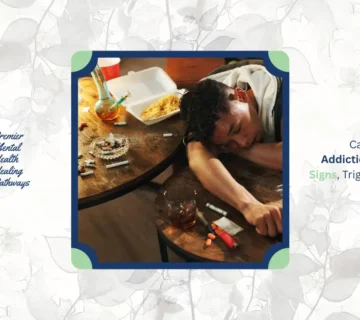A Traumatic Brain Injury (TBI) is a serious condition. It can influence memory, feelings, and performance.
But can a TBI cause schizophrenia?
Numerous individuals question whether brain traumas lead to psychological problems such as schizophrenia or bipolar disorder.
We will analyze the interplay between traumatic brain injury and schizophrenia. We will also look at other mental health issues related to brain damage.
Are you struggling with mental health after a head injury? At Premier Mental Health Healing Pathways, we’re here to help. We focus on Traumatic Brain Injury (TBI), Bipolar Disorder, and Psychosis. Our organization gives guidance fitted to your expectations. We create treatment plans filled with compassion. Book a consultation today!
What Is Traumatic Brain Injury (TBI)?
A traumatic brain injury (TBI) is something that arises suddenly, through which the brain is damaged, be it through impact or force.
An individual may face this due to accidents, falls, sports, or violence.
A TBI can range from a minor concussion to a serious injury. The more severe cases can impair normal brain functions.
Can a TBI Cause Schizophrenia?
Traumatic brain injury (TBI) can affect mental functions and the emotional response over extended time frames.
This brings up concerns about its relation to mental health problems, such as schizophrenia.
Schizophrenia is not caused by TBI, which is not a direct result of the injury to the brain. Schizophrenia may well happen to those who suffer severe brain injuries as well. A genetic predisposition further increases this risk.
The Link Between TBI and Schizophrenia
There have been various results that the researchers have reported on the link between TBI and schizophrenia.
Some say that brain injuries can be a cause of psychosis, others argue that TBI does not cause schizophrenia. Nevertheless, they both have some common patterns:
-
Increased Risk
A study revealed that a person who was hospitalized for TBI had a 2.2 times greater risk of developing schizophrenia or other kinds of psychosis that were not related to mood which is quite a possibility. This is because of the trauma they experienced.
-
Delayed Onset
Sometimes, TBI can mimic symptoms of schizophrenia even months or years after the injury. In this way, it is difficult for doctors to make a diagnosis.
-
Brain Damage
TBIs can sometimes cause damage to critical areas of the brain, for instance, the frontal cortex, temporal lobes, and hippocampus.
These are areas that are accountable for thinking as well as feelings. Therefore, both are poorly influenced by schizophrenia.
How Does TBI Contribute to Schizophrenia?
Brain Damage and Inflammation
The long-term swelling in the brain of TBI causes damage to brain cells which leads to the impairment of brain functioning as it does not properly function.
As a result, the increase in psychosis can be a consequence of the swelling.
Dopamine Problems
Dopamine is a brain communication agent. Its control has a profound consequence on schizophrenia.
Head trauma can impact dopamine levels, leading to spectral visions and distorted realities.
Damage to Brain Connections
The brain uses the white matter connections to move information around.
However, a TBI can spoil these connections, resulting in a thinking problem that is typical of schizophrenia.
Genetics and Environment
Schizophrenia is more likely to be present in some individuals because of their genetic predisposition to it.
If a person has this risk and after that, and then a TBI, it could lead to the start of schizophrenia.
Interestingly, this is the two-hit theory that establishes the fact that a genetic risk factor and a traumatic brain injury might combine and therefore the disease arises.
Signs of Schizophrenia Following a TBI
When a patient survives a TBI and has psychiatric symptoms, it’s crucial to look for signs of schizophrenia. These signs might appear as follows:
-
Hallucinations
This might include hearing voices that are not there, seeing strange things, and experiencing things that are not what they appear to be.
-
Delusions
They are when people get obsessed with strange ideas such as fears, or perhaps they have the illusion of being powerful and superior over others.
-
Disorganized Thinking
It involves poor concentration, loss of logic in thinking, and ineffective communication.
-
Cognitive Impairments
The problems that restrict weak memory, inefficient decision-making processes, or poor executive functioning are called cognitive impairments.
-
Negative Symptoms
This might mean that others are not present at work or that the person lacks motivation. Also, their emotions might be low, which can lead to neglecting personal hygiene.
Can Brain Injury Cause Schizophrenia Later in Life?
Some researchers believe that a brain injury in childhood or early adulthood may increase the risk of schizophrenia later in life. The long-term effects of traumatic brain injury schizophrenia may include
- Cognitive problems
- Emotional instability
- Increased susceptibility to psychotic disorders
TBI and Bipolar Disorder: Another Risk?
Alongside schizophrenic conditions, TBI and bipolar disorder may also be associated. Consequently, trauma triggers a permanent brain injury in people and the emotions can range from frightful periods to elevated activity.
Injuries to the brain from TBI can change emotional regulation thereby creating a situation resembling, such as bipolar disorder.
TBI and bipolar symptoms can look like other mental health issues. This creates challenges in identifying the issues.
Traumatic Brain Injury Psychosis: What You Should Know
TBI is a brain injury that can lead to developing a very intense condition which is called traumatic brain injury psychosis.
In this case, patients may face such problems as hallucinations, paranoia, and delirium, identical to a person suffering from schizophrenia.
Brain injury and psychosis can happen when the brain is unable to process information correctly as a result of being damaged.
Diagnosis and Treatment
Identifying schizophrenia in TBI patients is challenging. Reactions often combine with post-concussion syndrome and different psychiatric disorders
To find the truth, we use key tools:
- Neurological assessments
- Brain imaging, like MRI and CT scans
- Thorough psychiatric evaluations
These tools help create a clearer picture for accurate diagnosis.
Treatment for TBI-Related Schizophrenia
In the case that someone develops traumatic brain injury schizophrenia, treatment options may include:
Medications
Antipsychotic drugs can cope with symptoms, some being hallucinations and delusions.
Cognitive Therapy
Visiting sessions help individuals to deal with thinking and memory problems due to the injury.
Rehabilitation Programs
By getting brain rehabilitation, we can get back our functions and have much better mental health.
Lifestyle Changes
Workouts, good nutrition, and mindfulness strategies can promote your brain’s rebound.
Can TBI Prevention Reduce Schizophrenia Risk?
TBI prevention can be one way of lowering the chances of developing schizophrenia from head injury. There are a few ways that can be done:
-
Wearing Helmets
Doing it while playing sports, bike riding, or when riding motorcycles.
-
Seatbelt Use
Seatbelts are responsible for greatly reducing head injuries in car accidents.
-
Fall Prevention Strategies
To avoid elderly individuals or those like the ones that tend to fall, install the safety precautions.
-
Avoiding Risky Behavior
Being careful not to drink and do drugs, decreases the probability of head injuries, which are the number one cause among the children of the 15 to 24 age group.
Final Thoughts: Can a TBI Cause Schizophrenia?
TBI doesn’t induce schizophrenia, but it can activate it in a few persons. Neural inflammation and dopamine challenges may influence.
Genetic factors can also contribute, causing symptoms similar to schizophrenia after an injury.
Researchers are still investigating the bond between traumatic brain injury and schizophrenia. Timely support and rehabilitation can mitigate the persistent outcomes.
FAQs
Can brain damage cause schizophrenia?
A major brain injury can lead to schizophrenia, and even a mild one can trigger a psychotic illness.
What is the relationship between TBI and bipolar disorder?
The TBI and bipolar condition are closely linked. Both of them interfere with the normal operations of neurotransmitters and the normal functioning of the brain. As a result, mood regulation and impulsive behaviors are similar to bipolar disorders.
What should I do if I suspect a link between my brain injury and mental health symptoms?
If brain damage is the concern, approach a neurologist or a mind specialist. They are specialized doctors who can help you find the appropriate treatment. Get the appropriate treatment and you will be fine.






No comment